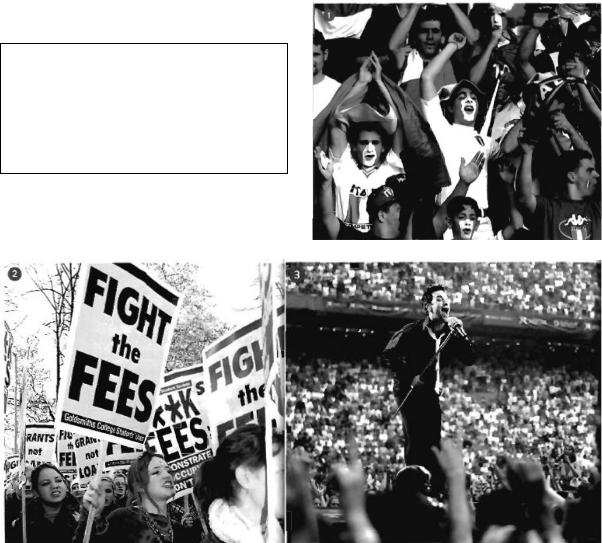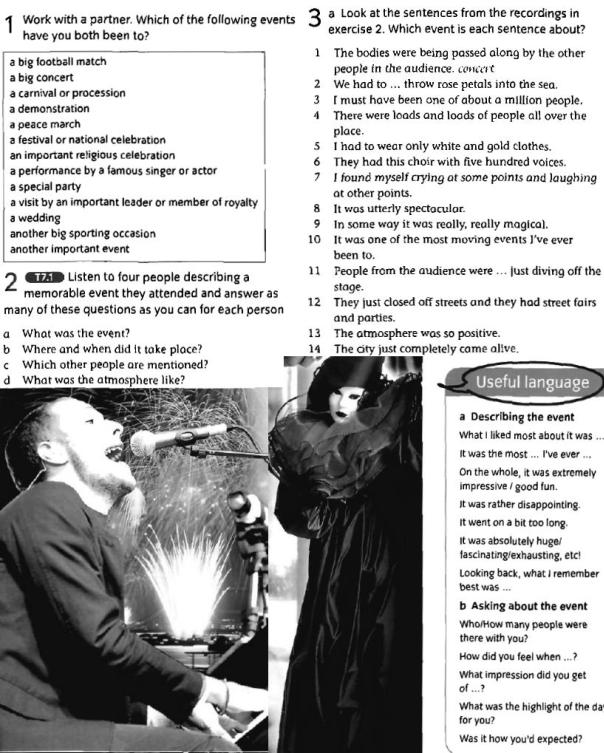
Солнцева Практический курс английского языка Ч.2 2011
.pdf
Министерство образования и науки Российской Федерации Национальный исследовательский ядерный университет «МИФИ»
К.В. Солнцева, Н.Л. Кудинова
Практический курс английского языка для студентов-международников
и специалистов в области наукоемких технологий. Уровень – бакалавриат.
II год обучения
Часть II
Рекомендовано УМО «Ядерные физика и технологии» в качестве учебного пособия
для студентов высших учебных заведений
Москва 2011
УДК 811.111 (075)
ББК 81.2Англя7
С60
Солнцева К.В., Кудинова Н.Л. Практический курс английского
языка для студентов-международников и специалистов в области наукоемких технологий. Уровень – бакалавриат. II год обучения.
Ч. II: учебное пособие. М.: НИЯУ МИФИ, 2011. 210 с.
Учебное пособие является второй частью комплексного учебника для студентов второго курса ИМО НИЯУ МИФИ и состоит из пяти юнитов, каждый из которых содержит материалы, объединенные общей лексической и грамматической тематикой.
Так же как и в первой, во второй части пособия предлагаются дополнительные материалы – грамматическая теория, дополнительные упражнения и собранный в одном разделе весь активный словарь, изученные за семестр, что призвано облегчить студентам работу с материалами настоящего курса.
Подготовлено в рамках Программы создания и развития НИЯУ МИФИ.
Рецензент Резник Ирина Владимировна, канд. филол. наук, доц., проф. кафедры грамматики и истории английского языка факультета ГПН Московского государственного лингвистического университета
ISBN 978-5-7262-1505-1
ISBN 978-5-7262-1507-5 (Ч.II)
© Национальный исследовательский ядерный университет «МИФИ», 2011
Корректор М.В. Макарова
Подписано в печать 15.11.2011. Формат 60х84 1/8.
П.л. 26,25. Уч.-изд.л. 26,25.
Тираж 170 экз. Изд. № 5/21. Заказ № 107.
Национальный исследовательский ядерный университет «МИФИ». 115409, Москва, Каширское ш., 31.
ООО «Полиграфический комплекс «Курчатовский». 144000, Московская область, г. Электросталь, ул. Красная, д. 42
Contents
Unit Seven. Social Matter
Grammar: Verbs + to infinitive / -ing, Habits – will, would, used to,
Present Continuous for annoying habits________________________________4
Unit Eight. Going global
Grammar: Reporting verbs with or without direct object, reported speech____39
Unit Nine. Health, Medicine and Prognosis for the Future
Grammar: Phrasal verbs, Adjectives and adverbs_______________________76
Unit Ten. Genius: Inventions, Architecture, Art
Grammar: Modals – possibilities, Narrative tenses (Past Tenses)__________115
Unit Eleven. Advertising, the media, cinema
Grammar: Relative clauses, Cleft sentences__________________________151
Supplementary Materials:
Grammar Theory______________________________________________184
Supplementary Translation Exercises_____________________________197
Supplementary Grammar: Phrasal verbs__________________________197
Active Vocabulary to the Spring Semester_________________________201
List of References ______________________________________________209
3

Unit Seven. Social Matter
Vocabulary and Speaking: Events and Celebrations 1. In pairs: what different events
and celebrations can you see in the photos? Which would you most/ least like to attend? Why?
2. In which photos can you see the following things:
an audience clapping, a carnival, a huge crowd, people going wild, an outdoor concert, spectators cheering a procession, people carrying placards, people in fancy dress, people singing and chanting, people waving flags and banners, a demonstration
3. Discuss the following questions in small groups:
• Do you enjoy being in huge crowds or not? Why / Why not?
Vocabulary: Extreme Adjectives
1. Put the adjectives in pairs with similar meaning within the same column. Do not match the first column to the second.
good |
|
angry |
bad |
big |
cold |
devastated |
|
unique |
|
enormous |
|
exhausted |
fascinating |
||
excellent |
|
freezing |
furious |
hungry |
interesting |
||
essential |
|
small starving |
terrible |
tiny tired |
|||
unusual |
|
upset |
|
|
|
|
|
important |
|
|
|
|
|
|
|
|
4 |
|
|
|
|
|
|
2. Match the extreme adjectives in the first column with their equivalents:
1. |
huge |
a) |
very angry |
2. |
tiny |
b) |
very large |
3. |
terrifying |
c) |
very noisy |
4. |
deafening |
d) |
very wet |
5. |
freezing |
e) |
very hungry |
6. |
gorgeous |
f) |
very funny |
7. |
furious |
g) |
very beautiful |
8. |
soaked |
h) |
very cold |
9. |
terrible |
i) |
very bad |
10. |
hilarious |
j) |
very tired |
11. |
starving |
k) |
very small |
12. |
exhausted |
l) |
very frightening |
3.Which intensifiers (very, quite, really, absolutely, etc.) can you use before extreme adjectives?
4.Complete the gaps with an extreme adjective from exercise 2:
1.The procession takes place at night in the middle of winter: wear warm clothes or you'll be absolutely________.
2.The group was so far away, all we could see were some _____ figures in the far distance.
3.It was a ______ moment when violence broke out between the police and the demonstrators.
4.The crowd had been standing in the rain for hours and was absolutely
________, but everyone remained good-humoured.
5.The crowd was really ________ when the referee sent off the home team's captain.
6.We were sitting right in the front row, so at times the noise of the group was absolutely________.
7.The film was so________ that many members of the audience walked out before the end.
8.Pictures of the concert were projected onto a ___video screen, so everyone could see perfectly.
9.The march lasted for hours and after they'd been walking for such a long time everyone was________.
10.The evening got off to a great start with a _______ speech by the principal: the whole audience was laughing.
11.There were huge queues at the food stalls, so by the time we got to the front we were absolutely ________.
5

12.All her fans agreed that Lucinda looked absolutely ________in her designer dress.
5. Choose the correct adjective or adverb. Sometimes both choices are possible.
1.Let's stay at home, it's very / absolutely freezing outside!
2.I was really / absolutely devastated when I heard the news.
3.This work of art is absolutely / a bit unique.
4.It's really / very important to have good friends.
5.Her new mobile is slightly / extremely unusual.
6.Be careful. The boss is very / absolutely angry.
7.These photographs are very good / excellent.
8.Mike's new house is really enormous / big.
9.Her latest book is extremely interesting / fascinating.
10.I'm absolutely hungry / starving - can we get something to eat?
11.Maria was a bit devastated / upset by her exam results.
6. What does the word „nice‟ really mean in the following word combinations? Choose two words from the box for each phrase:
beautiful charming |
delicious friendly picturesque productive |
relaxing restful |
|||
stylish tasty trendy |
useful |
|
|
|
|
1) |
a nice view |
3) |
a nice holiday |
5) |
a nice person |
2) |
a nice meal |
4) |
a nice jacket |
6) |
a nice meeting |
Grammar Revision: The Passive
6

Listening: A memorable Event
Before you listen make sure you know this vocabulary:
1) to attend sth, an overriding feeling, 2) a street fair, St. Basil‘s cathedral, a choir, to be surrounded by, a cannon, 3) gosh, a gig, to take no notice of sb/sth, spectacular, to dive off the stage (to stage-dive), 4) an eve (a Christmas eve, a
New Year‘s eve), rose petals, to go down to some place, ten hours prevously.
7

Vocabulary, Reading and Writing: Extreme Adjectives
Answers to page 26:
1.Congratulations! that IS good news!
2.What a pity. Some other time, perhaps.
3.Oh dear. When did you last have them?
4.Why? What‘s wrong with it?
5.Nothing serious, I hope.
6.That‘s nice. How long are you going for?
7.I hope it goes well for you.
8.You poor thing.
9.Cheers!
10.Why? What happened then?
8

Reading: Holidays Around the World
Reading: Festivals
1. Before you read the texts match the vocabulary units together:
9

1. |
pungent cheese |
a. |
ежегодный |
|
|
2. |
annual |
b. |
странный |
|
|
3. |
bizarre costumes |
c. |
отвечать (на агрессию) |
|
|
4. |
a lane |
d. |
мягкий |
|
|
5. |
to be dedicated to sth |
e. |
острый |
|
|
6. |
sauces, mustards and dips |
f. |
быть посвященным чему-либо |
||
7. |
squishy tomatoes |
g. |
тропинка, дорожка, трек |
||
8. |
to pelt the crowd |
h. |
соусы, горчицы, подливки |
||
9. |
to retaliate |
i. |
швыряться |
в |
кого-либо |
2.Read the texts, try to guess the meaning of the underlined words from the context.
3.What is the joke behind the slogan of the second festival?
4.Why are these statements false?
1. The English village of Stilton was originally famous for the cheese rolling
tradition.
2.Wooden replicas of cheese heads are used instead of actual cheese because the competitors often eat it during the competition.
3.The Fiery Food festival is a chance to sample the tastiest sauces and dips in the world.
4.The rule of the La Tomatina festival is not to hit women, children or old people.
5.Search the Internet for an unusual national or regional festival which would reflect the mentality of the country and tell the class about it.
Stilton Cheese Rolling
May Day is a traditional day for celebrations, but the 2.000 residents of the English village of Stilton -famous for its pungent blue cheese – must be the only people in the world who include cheese rolling in their annual plans. Teams of four, dressed in a variety of bizarre costumes, roll a complete cheese along a 50meter course. On the way, they must not kick or throw their cheese, or go into their opponents' lane, competition is intense and the chief prize is a complete Stilton cheese weighing about four kilos (disappointingly, but understandably
10
